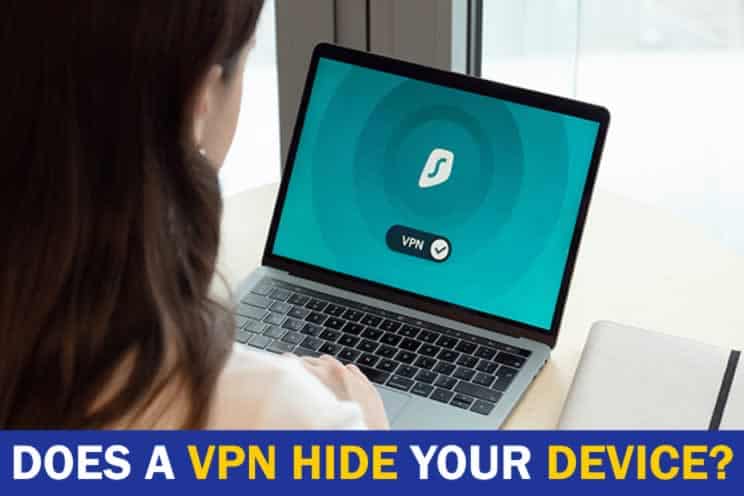
Hiding your device from the internet using a VPN sounds pretty straightforward but I wanted to make sure this was possible. I decided to look into the ways a VPN can hide identities to make sure internet activity remained anonymous.
Does a VPN hide my device? A VPN can’t hide a device from the Internet Service Provider (ISP) but it can hide the web browser traffic from the ISP by encrypting the traffic and using the VPNs DNS service instead of the ISP DNS. A VPN also hides the real IP address by assigning a fake one so websites visited will see the fake IP address and not the real one.
The ISP can see the device details as this is logged in the router when devices connect for internet connections including wi-fi connections. As the router is most probably supplied by the ISP, they have direct access to it and could log on remotely and see the connection logs if they wanted to.
I’m not overly concerned by the ISP doing this, because there is nothing for them to garner that is of any value. These logs will just have the name of the devices connecting to the router and the private IP addresses assigned to them by the router along with the public IP address assigned by the ISP.
The ISP won’t be able to see my internet browsing habits when I connect using a VPN because I am not using their DNS service anymore instead, I’m using the one supplied by my VPN provider.
The DNS service, which stands for Domain Naming Service is responsible to working out the IP address from a website name, allowing routers across the internet to direct your traffic to the right web servers where the websites live. It is like a detailed postal code (zip) and the DNS servers around the internet keep a directory of the mappings of website names and their corresponding IP addresses.
Without DNS, the internet would be a lot slower, as the website name does not give sufficient details of regions and exact locations of web servers, so having to rely on this would make the routing slower and bring down the user’s web browsing experience.
Websites find out about you by your IP address and if they know the IP address assigned by the ISP, they can work out your location albeit to the town or city you live in. With a VPN the website will find it harder to work out your location to a town or city because the VPN connection can be made to VPN servers around the world.
So, if I connect to a VPN server in Sydney Australia, then the website will only be able to see the IP assigned by the Sydney VPN server and so the website will assume the person is connecting from a device in the Sydney area, even though the device could be elsewhere.
What is a zero log VPN?
A zero log VPN will not keep any logs of your browsing habits including the websites you have visited and the times you visited including the day of visit. This zero logging is essential in hiding your device history across the internet has there are no breadcrumbs or trails to prove what you were doing.
Even though many VPNs will say they don’t log any information about you or your browsing habits, this still may not be the case. As there have been a number of cases where VPNs when pressed by law enforcement or government agencies have given up their logs. Logs which they said in their marketing on their websites they did not keep.
FREE VPNs can be notorious for keeping logs and it may make sense to try one of the paid for VPNs. If you’re unsure which one to pick, I’ve written an article called Are Paid VPNs Safe? 8 VPNs Security Checked for more information.
Does a VPN make you anonymous?
A VPN will make you anonymous to the websites you connect to but not to your ISP, as they will still know your real IP address as they supplied this to you, whilst websites visited will only see the fake IP address supplied by the VPN.
DNS Leaks
There are a few caveats to this though, as some VPNs can inadvertently leak the real IP address supplied by the ISP to websites, as these VPNs fail to ensure the DNS queries made on behalf of the user actually use the VPN DNS service. Instead the connection reverts back to using the ISP DNS service, thereby allowing the ISP to log all the different websites being visited.
These DNS logs can then be used at a later time if any investigation is required to illegal activities like downloading copyrighted material from torrenting websites. Armed with a court order and the real IP address, the details of the user associated with the IP address used at the exact time and date specified by the court order can be brought to justice.
WebRTC Leaks
Another type of leak is known as WebRTC leaks and this is where communications bypass the VPN thereby giving up the real IP address of the user. Applications like those used for VOIP (Voice over IP) such as those used to make phone calls over the internet, to instant messaging type apps are usually the ones which could contribute to WebRTC leaks.
Most quality VPNs are adept at stopping WebRTC leaks and aid in keeping the user anonymous.
Kill Switches
When VPN connections fail, those VPNs not armed with a kill switch will not be able to temporarily stop internet connectivity, allowing unprotected traffic from your web browser to reach the websites being visited.
This will give up the real IP address to the websites instead of the fake VPN assigned website. With a kill switch, all internet connectivity will stop immediately if the VPN connections fails and only resume once the VPN connection is back up. Believe me, VPN connections to fail regularly so it’s always best to use a VPN with a kill switch.
Can websites see your computer name?
I’m still not too sure whether it is difficult for websites to be able to work out the name of my device when I am browsing different websites. I know my web browser sends information called the ‘user agent’ to websites I visit.

This user agent contains a few details about the web browser I am using to the operating system my device is using. The user agent allows the website to tailor how it presents the content back to your web browser, as different web browsers may have quirks in how they represent website pages.
User agent can be especially useful for older web browsers as they can allow the website to send back a simpler representation of their website knowing the latest website structure will not work on the older browsers.
The user agent can tell type of device whether it’s a tablet, smart phone, computer etc. and by determining this and the web browser being used on the device, respond back with the appropriate web page code for the web browser.
There are also a number of websites that can show what information your web browser is revealing about you. I tried https://webkay.robinlinus.com/ and in the section ‘Network Scan’ it states ‘Any webpage can scan your local network for device’ but this did not pick up my device or any other devices connected to the same Wi-Fi I am using at home.
How does Google identify my device?
I have noticed when I log into Google, it is able to send me alerts about the name of the device I am using if I have not used that device before. so, possibly there could be a way of finding out my devices name, but I haven’t been able to work out how and test to see if it really works.
For my smartphone I think it is pretty easy for Google to work out the name of my device because I have a lot of Google apps installed on my Android phone. With Google PlayStore possibly being the culprit in sending my device name information to Google.
For my laptop, I am still trying to work it out as I don’t tend to log into Google’s website, and I don’t have any applications installed from Google.
Conclusion
Using a VPN can hide your IP address from the internet thereby hiding your device from the internet. Your ISP will still be able to determine what device you are using

